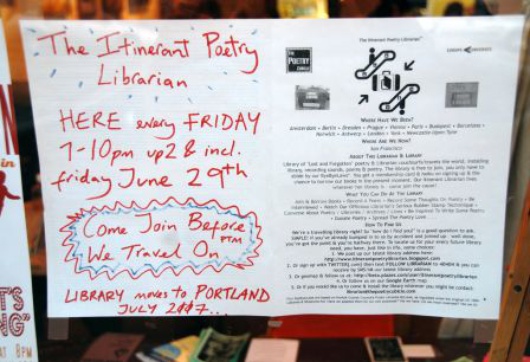The Itinerant Poetry Librarian: ‘Library by stealth’
Published on
Hardly a week goes by without an arts editor somewhere reminding us that our libraries are in decline. To show our solidarity with our favourite beacons of light and learning, we'll be profiling some wonderful and whimsical library projects over the next few weeks. First up: The Itinerant Poetry Library
It is a late November evening in Edinburgh, and the dark and the damp of the air have long since crawled into our bones as my friend and I stride along the city’s cobbled Grassmarket and into West Port, looking out for friendly chinks of light. After an age, we turn into the tiny, warren-like Armchair Books. Squeezed between the shop’s usual stock of second hand books, a selection of well-thumbed poetry books and pamphlets are laid out on a table. Behind the table is a personage of severe aspect: ill-fitting suit, round glasses, and hair scraped back into a ponytail, this is The Itinerant Poetry Librarian.
Earlier in the day (though no less wet), we had met the librarian, who had taken her severity off with librarian uniform, as she gave a talk at the West Port Book Festival, a festival that celebrates the independent bookshops which are clustered in this corner of the city.
 What would become The Itinerant Poetry Library had started in 2002 as a borrowed space which functioned as a library and venue for readings. However, as the years passed and control of the space became an issue, the librarian had a Eureka moment (albeit in bed and not the bath). The library was working, the building wasn’t: she had to get rid of the building. In 2006, she sold her possessions, booked a ferry to Amsterdam and worked out how many books she could fit in her rucksack. (She’s since discovered she carries more weight in her rucksack than a US marine does.) In the years since, the librarian has organised pop-up poetry libraries in such far flung places as Vancouver, Budapest and San Francisco. (‘I still have a bundle of clothes somewhere in Budapest!’ she confesses. ‘The Budapest poets were really generous, and gave me loads of poetry. I couldn’t fit it all in my rucksack, so it was a choice between poetry and clothes…’) Setting up shop in cafes, libraries and even graveyards, the library opens for a few hours at a time, and depending on how long the librarian stays in a city, books can either be borrowed or are simply available to be read in the library itself.
What would become The Itinerant Poetry Library had started in 2002 as a borrowed space which functioned as a library and venue for readings. However, as the years passed and control of the space became an issue, the librarian had a Eureka moment (albeit in bed and not the bath). The library was working, the building wasn’t: she had to get rid of the building. In 2006, she sold her possessions, booked a ferry to Amsterdam and worked out how many books she could fit in her rucksack. (She’s since discovered she carries more weight in her rucksack than a US marine does.) In the years since, the librarian has organised pop-up poetry libraries in such far flung places as Vancouver, Budapest and San Francisco. (‘I still have a bundle of clothes somewhere in Budapest!’ she confesses. ‘The Budapest poets were really generous, and gave me loads of poetry. I couldn’t fit it all in my rucksack, so it was a choice between poetry and clothes…’) Setting up shop in cafes, libraries and even graveyards, the library opens for a few hours at a time, and depending on how long the librarian stays in a city, books can either be borrowed or are simply available to be read in the library itself.
'Not Yet Knowingly Needed Knowledge'
It’s perhaps no coincidence that the library became mobile when it did. In 2006, as the librarian herself points out, couchsurfing was going strong and twitter had just started. ‘I was probably the first library, or librarian, on twitter,’ she grins, ‘and I do wonder whether I was the first person to use twitter as a real-time geo-location data-service. When everyone else was just using twitter to send messages to their mates, I was tweeting, here’s a map, here’s the time, come and find us. The idea behind the project was fifty per cent publicity and fifty per cent serendipity. You don’t even know that you’re going to go to a library today, but you happened to wander into us, or we wander into you. I really like that.’ The librarian calls it ‘library by stealth’, and one of the hopes (and achievements) of the library is that unsuspecting readers can stumble across poems which answer their needs at that particular moment, described by the librarian as ‘Not Yet Knowingly Needed Knowledge’.
The librarian admits that she’s occasionally had adverse reactions from other librarians, who’ve been less than enthralled by the library’s playing with stereotypes about libraries – from the librarian’s uniform and manner to The Itinerant Poetry Library Bye Bye-Laws, which parody the 1964 bye-laws that govern British public libraries:
"No person shall, after a warning by a library officer, persist in sleeping in the library. You may, however, try and get away with it. The Library Authority reserves the right to catalogue and add said persistent sleepers to the Library collection. Travel expenses for persons catalogued, in order to remain within the vicinity of the Library collection, are unavailable."
‘The point is – there are these stereotypes out there,’ exclaims the librarian. ‘You have to confront them! Once you’ve faced that stereotype, you can start to do interesting things with it.’ While frustrated with the lack of vision often governing public libraries in Britain, the librarian is fiercely passionate about the importance of libraries in the community and about the need for creative solutions to overcome the problems many libraries now face. What’s needed, she points out, is a flexibility and creativity which are often stifled by economic cuts, regulation of libraries, and, which is worse, a fundamental lack of recognition of the importance of libraries.
 With its concept of bringing the library into the community as well as its engagement with digital tools such as twitter, TIPL offers one such creative solution. ‘For me it was about mapping these digital tools together with the human – the human as in touch, personal intimacy, relationships. That’s what books are to me and a big part of the books in the library are very much the books as physical, tactile items. I don’t know how articulate I could be, but I know that’s intrinsic: those two things, the worlds of physical and digital, colliding and coming together. It’s all about the bridge between the two, being able to go back and forth across the bridge and where you meet in the middle.’
With its concept of bringing the library into the community as well as its engagement with digital tools such as twitter, TIPL offers one such creative solution. ‘For me it was about mapping these digital tools together with the human – the human as in touch, personal intimacy, relationships. That’s what books are to me and a big part of the books in the library are very much the books as physical, tactile items. I don’t know how articulate I could be, but I know that’s intrinsic: those two things, the worlds of physical and digital, colliding and coming together. It’s all about the bridge between the two, being able to go back and forth across the bridge and where you meet in the middle.’
TIPL survival kit: Goose-down boots (to ward off frostbite), washing line (doubles as wardrobe and poetry rack), espresso maker (when you have no food, smoke and drink coffee and you will forget you are hungry)
Images courtesy of Flickr: Itinerant poetry library sign (cc) Steve Rhodes; Books (cc) Andrei.D40



